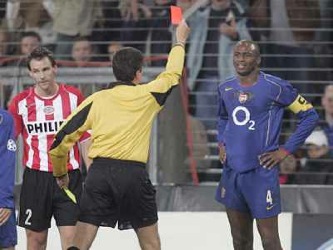Three wins and a draw in the league equates to a solid start for the team this season, but it cannot be ignored that after Gary Cahill’s second-half dismissal last Saturday, our opponents have been reduced to ten in three of our four matches thus far. Whilst we enjoy Arsenal securing results in style and building up a healthy goal difference, we also exercise caution and acknowledge that, as is the case for Chelsea, sterner tests will inevitably come. Having said that however, it has struck me that red cards in the Gunners’ favour have seemed like an ever-increasing occurrence in recent seasons.
Meanwhile, commentators remain quick to bring up Arsenal’s disciplinary record, tallying our sendings-off under Arsene Wenger every time the number increases, whereas I have had the feeling that the need for this is now redundant. A thorough glance (requiring an admittedly painstaking process) at every dismissal in Arsenal’s league matches under the current manager – from October 1996 to the present day – reveals a fair bit about the club and the approach of our opponents.
For many, the 2001/02 double-winning season is recognised as the peak of Arsenal’s tendency for red cards, due to a flurry of them early on in the campaign. There were a total of six for Gunners players over the course of that year (in fact coming in at a close second highest behind 1998/99’s seven), and they collected more cards – yellow or red – in total than any other side.
A sense of injustice brought about a mental toughness in the team, an ‘us against the world’ mentality that strengthened our determination to succeed and boosted our drive towards league and FA Cup glory. The consciousness of this reached its height at Anfield in December where, upon Giovanni Van Bronckhorst’s sending-off, the away support saw Arsenal go on to strike a 2-1 victory to the gleeful tune of “We’ve always got ten men”. In actual fact, this was more often the case for our opponents that season, who accumulated eight reds in total against Arsenal, and astonishingly, five in the opening four fixtures, which surpasses this season’s current ratio. In the second match, Danny Mills and Lee Bowyer were both sent for an early bath as Leeds won 2-1 at Highbury.
The stats suggest that 2001/02 was indeed something of a turning point. Up to and including that campaign, Wenger’s Arsenal received 4.8 red cards in the league per season. Since 2002/03, the Gunners have yet to amass more than three dismissals in one campaign, with an average 2.4 per year and just one in 2004/05, when a young Robin Van Persie lost his head against Southampton. Steadily, the likes of Martin Keown and Patrick Vieira were replaced by the ball-playing Kolo Toure and Alex Song. This has led to a natural shift in Arsenal’s style of play, with fewer old school British tackles and a stronger commitment than before to fluidity and easy-on-the-eye football – which, of course, we argue is one of the reasons for a minor dip in success. The eagerness and tenacity of Jack Wilshere, however, may see a rekindling of the buccaneering days of old, from the evidence seen so far this season.
Laurent Koscielny’s debut dismissal was the 49th in the league under Arsene Wenger. Our opponents’ red cards against us in the same timescale provide some telling statistics. They too have seen a reduction in dismissals – 5.2 prior to 2002/03, and 4.6 since – a reflection of the nature of the modern game overall. However, the numbers show that specific criticism of Arsenal’s disciplinary record over the last 14 years is unjustifiable. Looking at all of the club’s Premier League matches over the course of Arsene Wenger’s tenure, with a total of 71 our opponents have received 22 more red cards than the Gunners, and 18 more since the 2002 double.
This is brought about by the standard of the Arsenal team, the disparity in the technical speed of our players and, in the case of certain teams, the fallacy that the club can and therefore should be bullied into surrendering points. This has worked in the past, but not so much anymore. We are now learning how to reap the benefits if our opponents adopt irresponsible physicality. Arsenal often make the game look so simple that it seems as though we have an extra man on the pitch.
On more occasions in recent times, we have done.







